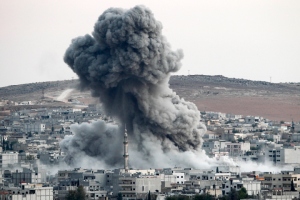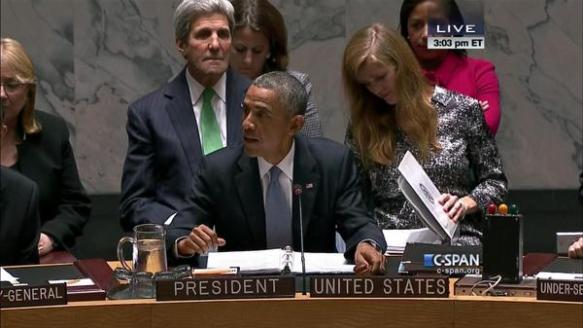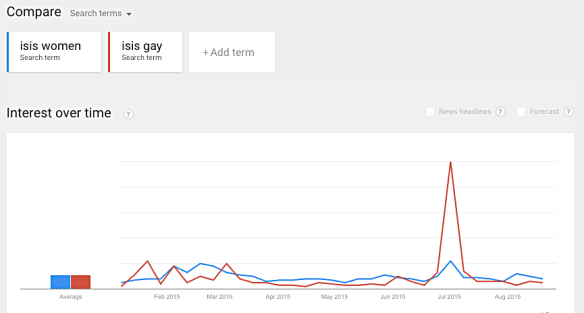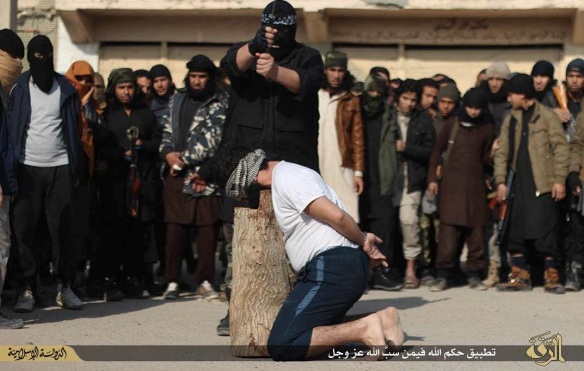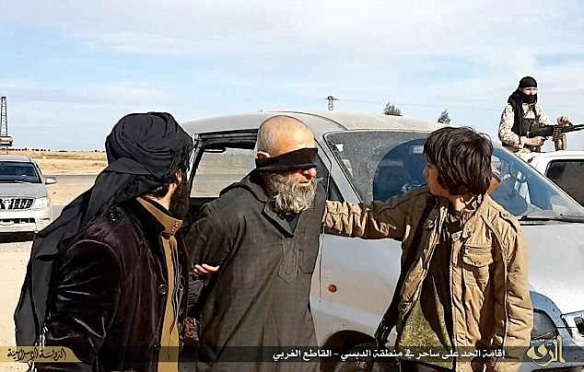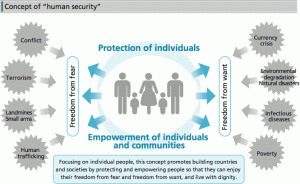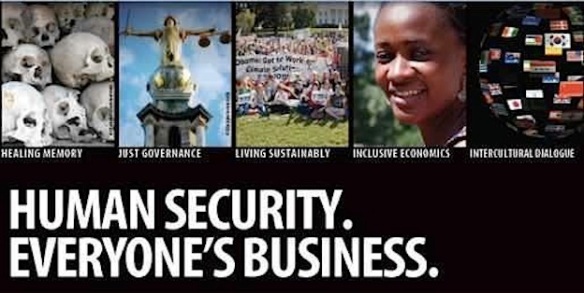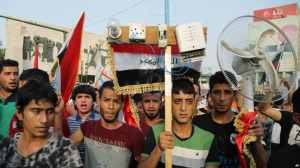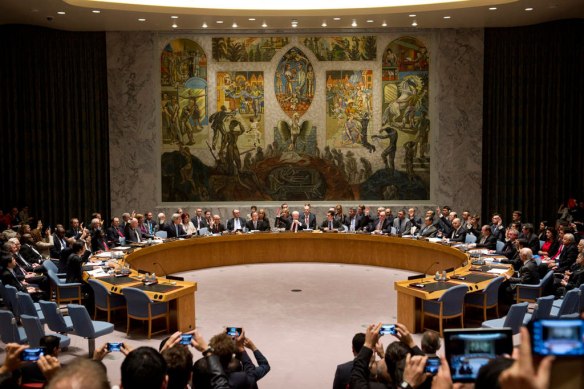Originally published no Paper Bird on 23/08/2015. Available at: http://paper-bird.net/2015/08/23/the-un-security-council-terrible-idea/
By Scott Long
I. Questions
On August 18, the Islamic State (also known as ISIS or ISIL or by its Arabic acronym, Da’ish) assaulted history. They beheaded an 82 year-old archaeologist, the resident expert on the ruins in the occupied city of Palmyra. Two days earlier, on August 16, Syrian government warplanes assaulted daily life; Assad’s pilots bombed a crowded market in the rebel-held town of Douma, near Damascus. They killed at least 96 people; hundreds more were wounded.
Here is a Google summary of searches worldwide for “Douma” and “Palmyra” over the past week. (I’m sorry for the graphs; they’re dull when so much shiny gore is available online.)
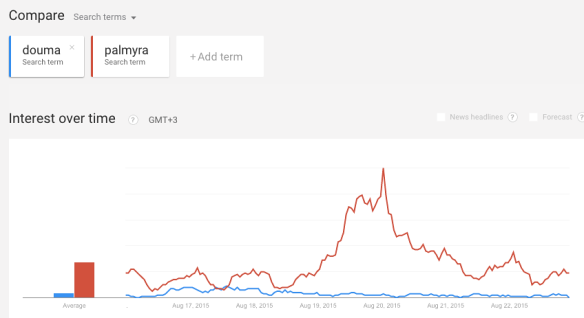 You see a small crest of interest in Douma at first, like a stone dropped in a swimming pool; but Palmyra’s a tsunami. And when you look up searches for “Assad” and “ISIS” last week, it’s like a local creek against the Euphrates:
You see a small crest of interest in Douma at first, like a stone dropped in a swimming pool; but Palmyra’s a tsunami. And when you look up searches for “Assad” and “ISIS” last week, it’s like a local creek against the Euphrates:
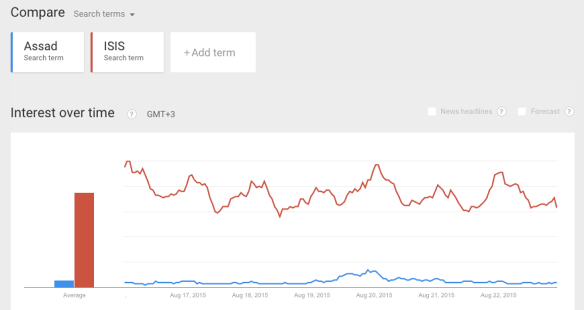 Strange disproportion: one death trumps one hundred, depending on who did it. ISIS has become a malignant fetish that crowds out other realities. We live in a world of manifold atrocities; but our minds, hooked like a perverse fanzine, are all Da’ish, all the time.
Strange disproportion: one death trumps one hundred, depending on who did it. ISIS has become a malignant fetish that crowds out other realities. We live in a world of manifold atrocities; but our minds, hooked like a perverse fanzine, are all Da’ish, all the time.
On Monday at the United Nations, the United States and Chile are hosting an informal meeting of the Security Council, to discuss Da’ish — and how it has “targeted one particular community with seeming impunity and scant international attention: LGBT individuals, and those perceived to be LGBT.” That’s from the US note inviting other states to the session. The meeting will “examine what kinds of protections are needed for LGBT individuals, what the international community needs to do to stop the scourge of prejudice and violence, and – related to this – how to advance equality and dignity, even in conflict zones.” And then the US and Chile “hope to discuss the multiple political, military, and social lines of effort needed to degrade and destroy” ISIS.
I interviewed dozens of LGBT Iraqis in 2009, and I’ve been in contact with scores more since. I’d never deny this is an issue of utmost urgency (just as I don’t scant the horror of an elderly archaeologist’s vicious execution). Refugees from Syria and Iraq will speak at the meeting; their voices deserve to be heard. But who’ll be listening?
Who is this is going to help? If you know Iraq, you have to ask: can Obama really stop the murders? I question the wisdom of letting the US and the Security Council set themselves up now as standard-bearers against these atrocities. How much is this driven by a strategy to help LGBT people, and how much by that uncontrollable tidal wave of fear and fascination over Da’ish that sweeps along governments and NGOs like flotsam, drowning every other event or context? Is there a plan, or is everybody just happy to ride the panic?
At best, the meeting will be useless. It’ll lead to that indolent repletion where people feel they’ve acted when they’ve actually done nothing. At worst, it’s going to cause more killings.
II. Strategy
NGOs mostly live by words; and the Obama administration shares with them a touching faith that history is made by merely talking about history. “This will be a historic meeting,” American Ambassador to the UN Samantha Power told reporters last week. “It will be the first Security Council meeting on LGBT rights.”
The administration went all out in the media for the historic meeting, getting Frank Bruni to promote it in his New York Times column — “American officials involved in it arranged for me to talk” to participants, Bruni wrote. He hit the same notes:
[It’s] the first time that the council has held a meeting of any kind that’s dedicated to the persecution of L.G.B.T. people, according to Samantha Power … And it’s an example, she told me, of a determined push by the United States and other countries to integrate L.G.B.T. rights into all discussions of human rights by international bodies like the U.N.
It’s cheap to make fun of “discussions,” and the things endlessly integrated into them. Remember: “Jaw-jaw always is better than war-war,” said Winston Churchill. On ISIS, though, Obama’s strategy is to try both. He jaw-jaws about human rights, and drops bombs.
The bomb-dropping is pretty much the limit of his abilities on the military side; after the murderous mess the US already made of Iraq, there is neither capacity nor will for any on-the-ground intervention. But the bombs give the US neither control nor leverage over what happens inside territory it thinks of as distant targets. The military action is completely disconnected from the human rights talk. And History, so blithely invoked by Power, suggests the disconnect goes deeper. The massive 1970-73 US bombing campaign against Cambodia’s Khmer Rouge only made the insurgent army more radical, its indifference to human life more drastic.
Moreover, the bombs haven’t worked even in military terms. Da’ish is trying to build state structures in the areas it controls, but it’s quite capable of folding them up like lawn chairs, reverting to guerrilla mode, and melting into the landscape. “Skillful in dispersing their men and hiding their equipment,” Patrick Cockburn writes, they’re hard to target. As of October 2014 “The air campaign of the US-led coalition had sent out 6600 missions, but of these only 632, or just 10 percent of the total, resulted in [actual] air strikes against targets on the ground.” Where Da’ish has failed is in a war of fixed positions; digging in around Kobane made them vulnerable. There the US bombed the hell out of them — 700 strikes; 2000 bombs dropped by one squadron alone — and forced their retreat. Yet Kobane was all propaganda for Obama and Major Kong, not a real turning point. Michael Weiss and Hassan Hassan note that ISIS’s defeats come “mainly within enemy [ethnic or sectarian] lines rather than in its geostrategic heartlands across Syria and Iraq.” It overstretches trying to conquer Kurdish or Shi’ite areas; it wins when defending its Sunni empire.
In other words, the Obama administration has no real way to counter ISIS’s killings of LGBT people, or most other human rights abuses the group commits. This doesn’t mean it shouldn’t talk about the abuses. But it’s vital not to confuse talk with the ability to act. Discussions aren’t “historic.” Change is. It’s cruel to LGBT people whose lives are at risk to celebrate so gushingly a discussion that has little chance of leading to change.
And there’s where the UN comes in. Since Da’ish captured Mosul fourteen months ago, the Security Council has grappled with a response. The UN is composed of states; it addresses itself to states; it deals with the crimes of insurgent forces mainly by asking states to act. The difficulty of state action against Da’ish is redoubled when one of the states involved, Syria, itself stands accused of war crimes. The Security Council passed a few resolutions about ISIS in the last year. In August 2014, it called for financial sanctions against Da’ish and al-Nusra (the local face of al-Qaeda). The next month, with great fanfare, at a session spangled with kings and presidents and chaired by Obama personally, it demanded that governments suppress the flow of foreign fighters to ISIS. Another vote, in February 2015, tightened the financial screws by banning all trade with Da’ish, including oil smuggling and the traffic in looted antiquities. Meanwhile, foreign recruits still stream to the Levant. And you can gauge the Security Council’s impact by the fact that Da’ish murdered Khaled al-Assad, the Palmyra archeologist, because he refused to reveal the hiding place of antiquities that would rake in a fortune on the market. The illegal trade rolls on.
The Security Council certainly isn’t contemplating a resolution on Da’ish and LGBT people; Russia would veto it. Nor is this meeting meant to lead to one. It’s a so-called “Arria formula” meeting, named for a Venezuelan diplomat who devised the format in the 1990s: these “are very informal, confidential gatherings” permitting “a frank and private exchange of views.” Or, as one observer says, they allow the Council to “open itself in a very limited way to the outside world.” NGOs are often asked to speak; but member states aren’t obliged to attend. Since early 2014, there have been almost no Arria meetings over ISIS, perhaps reflecting the Security Council’s sense of its own impotence.
The sole concrete outcome to which this particular Arria might contribute is one that seems entirely logical on paper, though off paper it’s fantastic as a Harry Potter outtake. The Security Council could refer ISIS’s crimes to the International Criminal Court (ICC). (Neither Syria nor Iraq has ratified the treaty that founded the ICC,meaning the court has no automatic jurisdiction over acts committed on their territory. But the Security Council can vote a referral, as it did with Mu’ammar Qaddafi in 2011.) There is mounting pressure for exactly this. A March report by the UN mission in Iraq and the High Commissioner for Human Rights found that ISIS actions “may amount to war crimes, crimes against humanity, and possibly genocide.” The ICC itself is eager to take up a case, any case, outside Africa (its exclusive preoccupation with that continent has led to debilitating charges of racism). Reportedly, it also wants to deal with LGBT issues.
But this won’t happen. There is certainly no question of sending LGBT killings alone to the ICC; any referral would cover a broad range of Da’ish crimes, from brutality against ethnic and religious minorities to the monstrous enslavement of women. Yet an investigation would still face huge political obstacles. Kevin Jon Heller, a professor of international law, notes that “The Security Council can’t just say that the court has jurisdiction over crimes by ISIS and nobody else. The Rome Statute is designed to prevent one-sided referrals.” In other words, a referral would open the Syrian regime to prosecution, probably along with other Syrian rebel groups. Across the border, Iraqi Shi’ite militias and the Iraqi government could also be liable. Russia and China would almost certainly veto any prosecution of their friend Assad. But the US and UK would also resist charges against their Syrian and Iraqi clients –“not least,” as Heller writes, “because it would provide the ICC with a backdoor to prosecuting their nationals for aiding and abetting rebel crimes,” and possibly Iraqi ones.
If the US did endorse a prosecution of ISIS, it might be politically tainted from the start. In April John Bellinger, a onetime Bush administration legal adviser, penned a New York Times piece, which one advocate called “a compelling case for referral.” It was peculiar. Bellinger wrote:
The United States has reason to be concerned about inappropriate and politicized investigations of the United States and Israel, but the International Criminal Court still has an important role to play in investigating and prosecuting acts of genocide, war crimes and crimes against humanity — all of which have reportedly been committed by the Islamic State.[emphasis added]
What? Bellinger writes almost as if a juicy ISIS trial would be a welcome distraction from any (unlikely) accountability for US abuses in Afghanistan, or Israeli ones in Gaza. His words recall how the Bush regime vehemently rejected the ICC, and indeed pressed client countries to abjure or undermine it. Under Obama, the US has been more flexible: employing the ICC against truculent states like Libya, while still maintaining immunity for itself and its allies. Such pliancy undermines both America’s credibility, and the court’s. In the — purely hypothetical — event that LGBT issues found their way into a US-prompted ICC indictment of ISIS, the contradiction with America’s exemption of itself and exculpation of Israel would be a front-and-center fact throughout the region. A polarization that implicates LGBT lives in power politics, and in the various hypocrisies of US policy, would do little for the safety of LGBT people in Iraq or Syria.
This Arria isn’t going to lead anywhere. There’s no strategy behind it. So why does the US want it now? I can tell you — in another graph.
That shows web searches for “ISIS” and “gay,” versus “ISIS” and “women,” since the start of 2015. The gays hold their own in this surreal competition most months; the spurts come at the points when shocking photos of executions spread on the web. From a woman’s perspective there are two reasons this race is rigged against her. First, gays form a more cohesive constituency, tuning their attention spans together, unlike the diffuse concerns of feminists and other women. Then come the pictures. Even when the New York Times and Human Rights Watch publish terrible, unbearable testimonies of enslaved Yazidi women, those rouse only gentle undulations on the blue line. They lack the power of photographs, the seduction and sheen of the unspeakable seen, the visual vertigo of identification.
And look at the last spurt, the perfect wave for the gays. That came in July, when a flood of awful execution photos was released. The US government attends to headlines. A month later, Samantha Power called the Security Council meeting.
There should be no competition between women’s rights and LGBT rights. But the imbalance in Google and in the government’s response is telling. In a melancholy analysis of `American failures over ISIS, Peter Harling and Sarah Birke write that the US doesn’t have a strategy — “a set of clearly-defined interests and goals achievable with available means.” It only has a narrative: images and gestures woven into a palliative, invented story.
The US … continues to desperately seek ways not to engage seriously with the region’s problems. It has developed a sophisticated narrative about a war on terror than thinly veils the absence of a genuine strategy. …. This is a reflection of broader, deeper trends in the Western political sphere. The policy- making process is increasingly dominated by public relations, as spectacular events prompt a rush to put out statements … [these] later inspire and constrain practical measures that must be made to fit into a narrative rather than into a strategy.
There’s your Security Council fairy tale. Brave Obama, bold leadership, coalition, noble victims, historic first. It’s a beautiful story: except, of course, that US policy is being made by the photos its enemies put out. It’s also clear whose good will Obama wants: gay Americans’, not gay Syrians’ or Iraqis’. Last month, the President announced a revamp of “strategy” against Da’ish: “shifting focus to counter ISIL’s public relations machine while training local forces to sustain progress made on the ground there.” Less bombing, more hearts and minds. But whose hearts and minds?
When Samantha Power wanted to tell her story about LGBT people’s rights, she didn’t call Al Hayat, or Al Jazeera. She didn’t call any media that people pay attention to in Syria or Iraq. Neither she nor the NGOs she works with tried to “counter ISIL’s public relations machine.” She called the New York Times.
III. Power
If the only problem were Obama’s need for publicity, it wouldn’t matter. I fear, though, that the Security Council will only give more impetus to murder.
“Many have asked what needs to be done about the Islamic state of Iraq and al-sham,” writes Jessica Lewis of the Institute for Understanding War, in an understatement. Everybody has a grand theory of ISIS. I don’t see why I shouldn’t too. After all, I live in a country where the Da’ish franchise operates with increasingly lethal boldness; they kidnap Westerners from neighborhoods where I do my shopping. Proximity might lend an even better claim to expertise than having an air-conditioned office inside the Beltway.
ISIS’s appeal is twofold, and it has to do with power. Lewis observes that Da’ish is both an army and a government, “operating in both military and political spheres.” As an army, it holds loyalties because it gives recruits a personal sense of power that life has largely denied them. As a proto-state, it sustains control because it uses power in ways that, however irrational from outside, seem comparatively coherent to many in the chaos of Iraq and Syria. You assert power by standing up to other powerful people — just as Da’ish’s recruits defy their childhood norms, their governments, and often their families to join the ISIS adventure. For the movement, standing up to the Security Council has no downside; the UN can’t hurt them. To continue a killing campaign that’s been publicly deplored by powerful states in far New York affirms the movement’s own claim to power. Murder says defiantly: Yes, we can.
The public character of ISIS’s violence asserts an imaginative authority. Harling and Birke explain:
One of the particularities of the movement calling itself the Islamic State is its investment in the phantasmagorical. It has an instinctive understanding of the value of taking its struggle to the realm of the imagination as the best way to compensate for its real-world limits. … This may explain, in part, how it is increasingly resorting to crimes that are not just horrific but spectacularly staged, such as the immolation of Jordanian pilot Moaz al-Kassasbeh or the mise-en-scène of the beheading of 21 Egyptian Copts on a Libyan beach. The Islamic State is at its most dangerous in its interaction with the psyche, the fantasies, the frustrations and the fears of others, from the converts it attracts to policy-makers and analysts.
What are these fantasies? That ISIS uses the allure of sex slaves to enlist sex-starved men has become a cliche. “Sexual repression in Muslim communities is the foremost reason behind these terrorist organizations’ popularity,” one analyst says. Sex is “a recruiting tool to lure men from deeply conservative Muslim societies, where casual sex is taboo and dating is forbidden,” the New York Times agrees. (Never mind that some recruits seem to be seeking sexual repression, not fleeing it.) These pop excuses ignore one of feminism’s important insights: that rape is about power, not just sex. To have a sex slave is to have a slave. Da’ish entices less with orgasms than with the delirium of ownership.
Da’ish’s displays of total power attract recruits who want to share in it. But for populations who live under the Islamic State, what makes it tolerable — even attractive — is that its authority is embodied in a legal system. The militias that plagued Iraq in its years of civil war kidnapped victims; corpses turned up days later, skulls pierced by power drills. The Islamic State reflects the rule of law, by contrast, however abhorrent the laws. The relative bureaucratic rationalization under ISIS is part of its state-building aspiration, and of its appeal.
Although its Western image is one of roving boys enforcing whims, ISIS in fact has three organized police forces: the ordinary police, the squadrons for religious morals called the hisba (seemingly modelled on Saudi Arabia’s fearsome units for promoting virtue and preventing vice), and security services to patrol dissent. Trials, in principle, precede sentences — though Sarah Birke, after interviewing refugees from Da’ish’s Syrian capital in Raqqa, says no one “was sure whether ISIS’s sharia courts actually listen to evidence … several noted that gruesome punishments are sometimes meted out on the spot to instill fear.” The organized state keeps lapsing back into expressions of personal power. And as with the Khmer Rouge, the bombs seem to bring naked violence to the surface.
Some Raqqa residents said that until the US-led air strikes, you were safe if you followed the rules, however perverse, that were posted on walls and circulated quickly by word of mouth. But the air strikes have made ISIS more paranoid and prone to kidnapping people randomly, the women told me.
Da’ish has two faces: the military movement and the nascent government. But both are power; power is their attraction.
Does anyone think that, given an easy chance to affirm its law and write its defiance of the Security Council in blood, Da’ish won’t take it?
IV. Security
Belief that the Security Council should be the venue for talking LGBT people’s human rights is part of the ever-growing concept of “human security.” It’s a dangerous concept. Before they buy into it, LGBT people need to ask some questions.
Historians of the “human security” idea usually trace it to the UN’s 1994 Human Development Report, which introduced the notion that “freedom from want” and “freedom from fear” — from Franklin Roosevelt’s Four Freedoms — were critical to global security. From there, the story goes, it was taken up by noble states like Canada and Norway, who built consensus around treating public health, food, and the environment as security concerns. No one knows yet what “human security” means — “Existing definitions,” writes Rolland Paris, “tend to be extraordinarily expansive and vague, encompassing everything from physical security to psychological well-being” — but it’s a Good Thing.
Human security has roots outside the touchy-feely development field, however. To adopt it as a frame for LGBT rights, or any rights, is to take on this burdensome past. Its real origins lie not in the UN but in the thinking of Cold War security experts, forced to wrestle in the 1990s with a suddenly disorderly world. New threats to governments’ power loomed — ones that were always there, perhaps, but now acquired new menace, bursting free of the bilateral structures of superpower rivalry. They elbowed out the old bogeymen, peasant insurgencies and nuclear wars. David A. Baldwin wrote in 1995:
With the end of the cold war have come numerous suggestions that resources once devoted to coping with military threats now be used to deal with such nonmilitary threats as domestic poverty, educational crises, industrial competitiveness, drug trafficking, crime, international migration, environmental hazards, resource shortages, global poverty, and so on.
Stephen Walt, in a controversial piece from 1991, argued against this expansion of the term — against “making the term ‘security’ so inclusive that it included virtually anything that might affect human welfare.” But his was a losing fight. Soon a plethora of formerly human issues were being rethought as “security” ones. The UN’s happy platitudes merely reflected a sense that to speak in security terms was the only way to get heard.
What defines “human security” is not the demilitarization of security thinking. It’s the militarization of everything else. What isn’t there a “War on” these days? Each problem’s a pretext for exceptional action. (Alex de Waal has written perceptively, for instance, about the dangers of militarized responses to public health crises.) One scholar of international relations identifies “the politics of existential threat” as the core of the new security studies.
The distinguishing feature of securitization is a specific rhetorical structure (“survival,” priority of action “because if not handled now it will be too late, and we will not exist to remedy our failure”). In security discourse an issue is dramatized and presented as an issue of supreme priority, and thus by labeling it “security” an agent claims a need for and a right to treat it by extraordinary means. ….
The gauzy concerns of human security — freedom from want and fear — blend readily into coercion, armed intervention, and emergency repression.
Look at the makeup of the Human Security Network, one of the international flagships for the idea. Norway and Canada launched this grouping of nations back in 1998, on the “principle that the true rights-holders in our world are not states and governments but rather the individuals for whose benefit they exist and in whose interests states are supposed to act.” Current members are Austria, Chile, Costa Rica, Greece, Ireland, Jordan, Mali, Norway, Panama, Slovenia, Switzerland and Thailand; South Africa’s an observer.
What nice countries! Yet when it comes to the American war on terror, many of these take security in less-than-human terms.
Jordan, for instance, has been “a key ‘hub’ in the USA’s secret “renditions” programme,” according to Amnesty International: it jailed and tortured manifold victims en route to “black site” prisons. Ireland is a lovely place, with gay marriage to boot; but it handed Shannon Airport to the CIA, to use as a stopover in sending prisoners off to torture. Thailand hosted a secret prison called “Detention Site Green,” sufficiently awful that nearly all information about it was redacted from the recent US Senate report on torture. And democratic South Africa illegally rendered two terror suspects to torture in Pakistan, in one case handing him to CIA custody first.
The human face of human security is a mask. It covers mid-level states obediently following US orders — and pursuing indigenous agendas of blood and fear. Jordan notoriously will torture just about anybody to protect the state from anything. Canada, until a few years ago, imprisoned sex workers — apparently for their “safety.” And Thailand’s own security paranoia led to a military “war on drugs” starting in 2003: soldiers and cops killed almost 3000 people.
“Human security,” Rhonda Howard-Hassmann argues, has tense relations with human rights:
the broader view of human security at best repeats, and possibly undermines, the already extant human rights regime, especially by converting state obligations to respect individuals’ inalienable human rights into policy decisions regarding which aspects of human security to protect under which circumstances. … The discourse of human security is not one of state obligations and individual entitlements: it is a discourse that permits states to make choices as to what aspects they wish to protect.
The international obsession with ISIS proves her point. It’s obvious that, however skilled Da’ish is at publicizing its own horrors, the atrocities of Assad’s government dwarf those of the Islamic State. The US and its allies choose to concentrate on the latter, not the former. Parly this is driven by the headlines and the Google searches, by Da’ish’s dominance of the imagination; but it’s also a policy decision. The US believes Assad is on the wane; whereas it sees ISIS as rising, and a major security issue. This may or may not be true, but humanity is utterly at odds with security here. The US does nothing to help Syrians who are dying; and, manipulating ISIS’s death toll as a tool of raison d’état, it does little for Da’ish’s victims either.
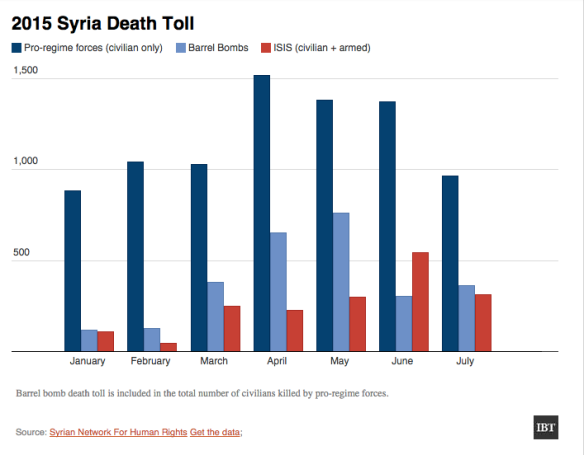 This cynicism’s effects show up elsewhere. I live in Egypt, a country where the US has some influence; yet the Obama administration does nothing about arrests and torture of LGBT people – or any of the other human rights violations that have burgeoned under military dictatorship. No Arrias, no indignation. The contrast with Da’ish is depressing. Egypt is not a “security issue”: or rather, Egypt promotes security by torturing and killing people. Prattle about human security only weakens Egypt’s beneficent work bolstering the safety that counts, that of states in a pliant international order.
This cynicism’s effects show up elsewhere. I live in Egypt, a country where the US has some influence; yet the Obama administration does nothing about arrests and torture of LGBT people – or any of the other human rights violations that have burgeoned under military dictatorship. No Arrias, no indignation. The contrast with Da’ish is depressing. Egypt is not a “security issue”: or rather, Egypt promotes security by torturing and killing people. Prattle about human security only weakens Egypt’s beneficent work bolstering the safety that counts, that of states in a pliant international order.
Increasingly, Western governments are taking on LGBT issues as their foreign-policy concerns, often, like the US, in a framework of “security.” It’s a good deal for LGBT NGOs based in New York or Geneva. They get recognition, and with it funding and power. It’s not always good for LGBT people on the ground who face danger. Their lives are suddenly tangled up with the politics and schemes of governments thousands of miles away. And they can be reviled, punished, killed in consequence.
Dianne Otto, a friend and a feminist scholar of international politics, has written about women’s movements’ decades-long engagement with the UN Security Council, which flowered in four Council resolutions on “women, peace, and security.” Initially critical, she has moved toward cautious optimism. Her analysis demands study by anybody contemplating the Security Council as a home for LGBT rights. She credits feminism with “disrupting the Council’s conservative gender script and prompting remarkable levels of institutional activity.” If feminists succeeded in moving the Council, though, it’s because they never surrendered to its agenda, remaining both intellectually independent and responsive to the grassroots. Their story shows “the critical importance of feminist activism outside institutional control, which can resist the ways that institutions capture feminist ideas and turn them to their own purposes.”
The difference in how diplomats see feminist advocates and how they see LGBT activists is the difference between a movement that’s politically powerful, and one that’s politically useful. Can LGBT politics evade subordination to great-power agendas, “security” frameworks, and exploitation? It’s an open question.
V. What is to be done?
One thing that will surely be jaw-jawed in the Security Council meeting, and one area where it could lead to constructive action, is increased help for LGBT refugees from Syria and Iraq. LGBT people who have fled to other countries in the region — Lebanon, Jordan, Egypt — still face severe threats there. Two months ago in Egypt, a Syrian refugee was entrapped over the Internet, convicted of homosexual conduct, and eventually deported. The UN High Commission for Refugees has done nothing to protect other LGBT refugees in the country.
These people deserve accelerated resettlement to safe countries, and Security Council members would do well to urge that. Yet to say that LGBT refugees should be processed faster doesn’t mean they should be resettled instead of other refugees. If resettlement becomes a competition, where queers get berths and displace persecuted Christians, or Yazidis, or women, the perceived privilege can only deepen hatred of LGBT refugees. The danger is that Western governments who don’t want Syrians or Iraqis will take a small dollop of LGBT ones, then announce they’ve done their duty, and close their doors. I doubt whether the Security Council — whose permanent members, including the US, have woefully avoided their obligations to refugees — will be sensitive to this danger.
Refugee protections, though, won’t solve the situation in Syria and Iraq. International LGBT groups sometimes assume “helping people” simply means “getting them asylum.” Asylum is a vital human right; but, as I wrote two years ago, “Escape substitutes for protection. The asylum system – unwieldy, prejudiced, deeply flawed — serves as the nearest thing we have to a security plan for the international LGBT movement.” As intractable as the situation may seem, a real “historic step” would entail much more than mere discussions, and more than finding victims an escape hatch.
LGBT people’s rights can’t be lopped from the full context of the violence in Iraq and Syria. But this means recognizing the utter failure of the “security”-based solutions the US has promoted. We invaded Iraq at the behest of our own security state. We rebuilt a security state in Baghdad, and it imploded. Another security state sprang up under ISIS (Da’ish, Sarah Birke found, imposes its will mainly “by security services, just as it was under the Baathist regime in Iraq and continues to be in Assad’s Syria”). It may implode too, or its violence may keep it going. But the US, with its CV of disasters, can do little to hasten its disappearance.
Timidly I offer one specific and one general solution — and the US can’t do much about either. Those targeted as the “people of Lot” in Iraq and Syria aren’t large populations. They need places where they can live quietly, without being “out” in any Western way, without daily state harassment, and with some protection from violence in families or communities. They need to be left alone. To get the governments to leave people alone would entail engaging with Iraqi (and Syrian) opinion on sexuality in ways that no state or international NGO has done so far, and furthering the very limited elite sympathy for LGBT victims that years of violence (especially in Iraq) elicited. It might involve finding tacit enclaves where let-alone policy was possible; parts of pacified Southern Iraq or Kurdistan could do, though such areas, already purged to extirpate diversity, would look with suspicion on Sunni or Arab migrants respectively. It’s all a long shot, but it’s also the best realistic hope for most lesbian, gay, bisexual, and transgender people.
More generally, the security model needs to go. Iraqis and Syrians want safety — from Da’ish, from militias, from common criminals, from bomb-mad militaries, and from the corrupt police. They also want governments that protect them from sickness and hunger. This month Iraqis are protesting, in 120-degree heat, for the state to furnish enough electricity to run air conditioners. We need to stop “integrating” welfare into a framework of security issues, and instead see security as a small part of the spectrum of welfare issues. New thinking about the state, a revival of welfare as the goal of government, must emerge from the dust and gore.
Writing just after 9/11, Giorgio Agamben described how, with welfare states surrendering to the assault of neoliberalism, governments found renewed legitimacy in fear:
In the course of a gradual neutralization of politics and the progressive surrender of traditional tasks of the state, security becomes the basic principle of state activity. What used to be one among several definitive measures of public administration until the first half of the twentieth century, now becomes the sole criterium of political legitimation. The thought of security bears within it an essential risk. A state which has security as its sole task and source of legitimacy is a fragile organism; it can always be provoked by terrorism to become itself terroristic. … European and American politicians finally have to consider the catastrophic consequences of uncritical general use of this figure of thought.
The catastrophe is nowhere more evident than in the Arab lands; the imported security-state model brought nothing but disintegration and death. LGBT people are among the innumerable victims. Resort to the Security Council will not help them. Securitizing rights under the aegis of foreign action only pits the victims permanently against the communities they come from. The New York discussions will continue, unstanched, unstoppable. So will the killings.
Source: http://paper-bird.net/2015/08/23/the-un-security-council-terrible-idea/



